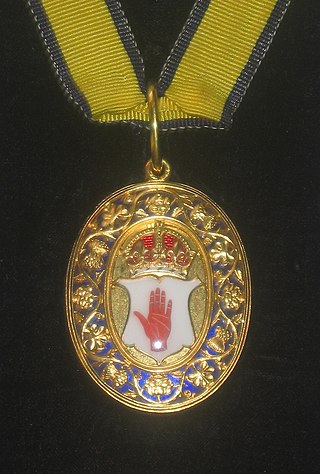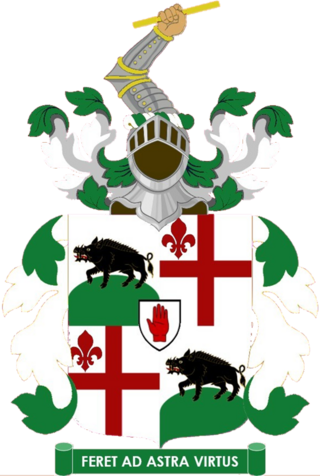Related Research Articles

A baronet or the female equivalent, a baronetess, is the holder of a baronetcy, a hereditary title awarded by the British Crown. The title of baronet is mentioned as early as the 14th century; however, in its current usage it was created by James I of England in 1611 as a means of raising funds for the crown.
There have been four baronetcies created for persons with the surname Leslie, one in the Baronetage of Nova Scotia, one in the Baronetage of Ireland, one in the Baronetage of Great Britain and one in the Baronetage of the United Kingdom. Three of the creations are extant as of 2010.
There have been five Baronetcies created for people with the surname Forbes, four in the Baronetage of Nova Scotia and one in the Baronetage of the United Kingdom. The first holder of the Burn Baronetcy of Jessfield, created in the Baronetage of the United Kingdom in 1923, assumed the surname of Forbes-Leith of Fyvie in 1925.

There have been four baronetcies created for persons with the surname Hope, three in the Baronetage of Nova Scotia and one in the Baronetage of the United Kingdom. As of 2010 one creation is extant, one dormant and two extinct.
The Davson Baronetcy, of Berbice in British Guiana, is a title in the Baronetage of the United Kingdom. It was created on 21 January 1927 for Edward Rae Davson. He was Chairman of the Federation of Chambers of Commerce of the British Empire and a member of the Imperial Economic Committee and the Colonial Development Advisory Committee. Davson married Margot Elinor, daughter of Clayton Louis Glyn and his wife, the novelist Elinor Glyn. He was succeeded by his eldest son, the second Baronet. Like his maternal grandmother he was an author. In 1957 he assumed by deed poll the surname of Glyn in lieu of his patronymic as well as the additional forename of Anthony. As of 2014 the title is held by the latter's nephew, the fourth Baronet, who succeeded his father in 2004.
The Debenham Baronetcy, of Bladen in the County of Dorset, is a title in the Baronetage of the United Kingdom. It was created on 28 January 1931 for Ernest Debenham, Chairman of Debenhams Ltd.
There have been two baronetcies created for persons with the surname Joseph, both in the Baronetage of the United Kingdom. One creation is extinct while one is extant.
There have been nine baronetcies created for persons with the surname Moore, two in the Baronetage of England, one in the Baronetage of Ireland, two in the Baronetage of Great Britain and four in the Baronetage of the United Kingdom. As of 2014 two creations are extant and one is considered dormant.
The Goulding Baronetcy, of Millicent in Clane in the County of Kildare and Roebuck Hill in Dundrum in the County of Dublin, is a title in the Baronetage of the United Kingdom. It was created on 22 August 1904 for the businessman William Goulding, a prominent freemason who was director several railway companies in Ireland, and son of William Goulding (1817–1884), the last Conservative MP for Cork City. He accompanied the Church of Ireland Archbishop of Dublin John Gregg and Bishop of Cashel Robert Miller "to see Michael Collins in May 1922, following the murders of thirteen Protestants in the Bandon valley, to ask whether the Protestant minority should stay on. Collins 'assured them that the government would maintain civil and religious liberty'."
There have been four baronetcies created for persons with the surname FitzGerald, one in the Baronetage of Ireland and three in the Baronetage of the United Kingdom.

The Kellett Baronetcy, of Lota in Cork, is a title in the Baronetage of the United Kingdom. It was created on 6 August 1801 for Sir Richard Kellett, with remainder to the heirs male of his father Richard Kellett. On the death of the second Baronet in 1886 the title passed to the third Baronet, a descendant of Henry Kellett, younger brother of the first Baronet. However, he did not assume the title until 1906. The presumed fifth and sixth Baronets did not successfully prove their succession and were not on the Official Roll of the Baronetage. The presumed seventh Baronet has also not successfully proven his succession and is not on the Official Roll of the Baronetage, with the baronetcy considered dormant since 1966.

The Wombwell Baronetcy, of Wombwell in the County of York, is a title in the Baronetage of Great Britain. It was created on 26 August 1778 for George Wombwell, Chairman of the Honourable East India Company and Member of Parliament for Huntingdon. The fourth Baronet fought in the Crimean War and took part in the Charge of the Light Brigade and in 1861 served as High Sheriff of Yorkshire. As of 13 June 2007 the presumed seventh and present Baronet had not successfully proven his succession to the title, and is therefore not on the Official Roll of the Baronetage, with the baronetcy considered dormant since 1977.
The Leith, later Leith-Buchanan Baronetcy, of Burgh St Peter in the County of Norfolk, is a title in the Baronetage of Great Britain. It was created on 21 November 1775 for Alexander Leith, Member of Parliament for Tregony. The third Baronet married Jemima, daughter of Hector Macdonald Buchanan. Their son the fourth Baronet assumed the additional surname of Buchanan in 1877. Neither the presumed seventh Baronet nor eighth Baronet successfully proved their succession and were not on the Official Roll of the Baronetage. Following the death of the 8th Baronet in a motor vehicle accident in 2018, the title passed to his son, the 9th Baronet; he also has not proven his claim to the title.
There have been seven baronetcies created for persons with the surname Sinclair, six in the Baronetage of Nova Scotia and one in the Baronetage of Great Britain. Four of the creations are extant as of 2008.
There have been two baronetcies created for persons with the surname Hawley, one in the Baronetage of England and one in the Baronetage of Great Britain.
There have been four baronetcies created for people with the surname Innes, three in the Baronetage of Nova Scotia and one in the Baronetage of the United Kingdom. Three of the creations are extant as of 2010.
There have been four baronetcies created for persons with the surname Hay, all in the Baronetage of Nova Scotia. Two creations are extinct, one dormant and one extant. A fifth baronetcy in the Jacobite Peerage, although theoretically extant, is not recognised by the Lyon Office.
There have been four baronetcies created for persons with the surname Seton, all in the Baronetage of Nova Scotia. As of 2008 one creation is extant, one dormant and two extinct.
There have been three baronetcies created for people with the surname Moncreiffe or Moncreiff, two in the Baronetage of Nova Scotia and one in the Baronetage of the United Kingdom. Two of the titles are dormant, as the heir has not proved his descent, and one is extant, though its holder does not bear the surname of Moncreiffe.
References
- Kidd, Charles, Williamson, David (editors). Debrett's Peerage and Baronetage (1990 edition). New York: St Martin's Press, 1990, [ page needed ]
- Leigh Rayment's list of baronets